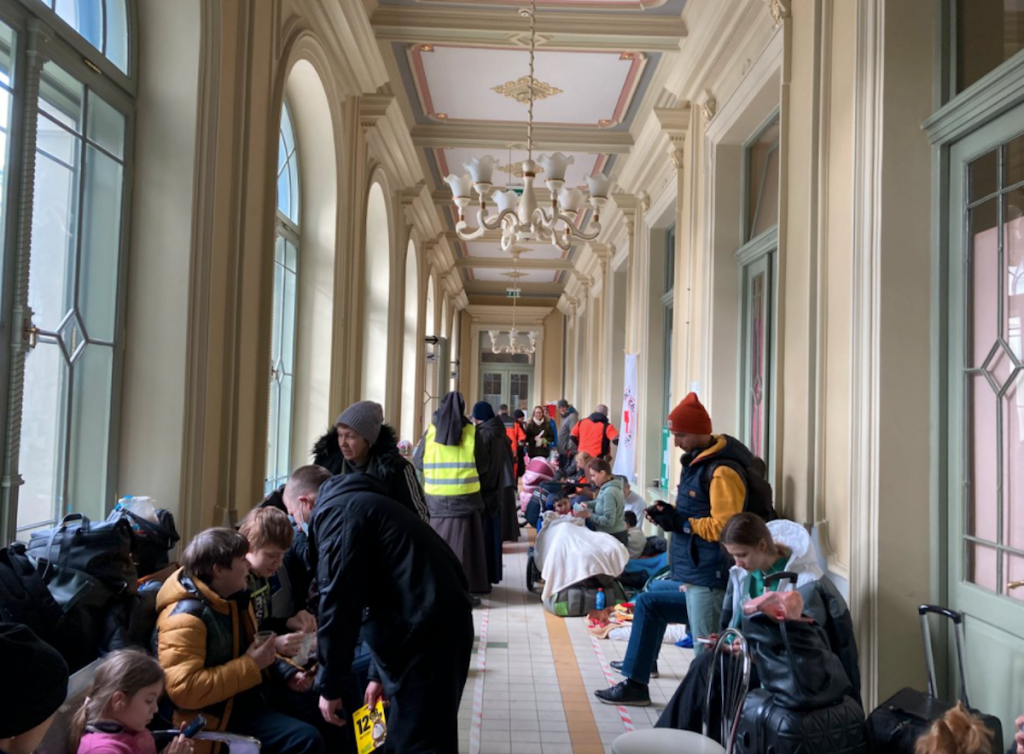“You know the number-one thing people want?” asked Kerri Murray, Santa Barbara’s president of ShelterBox, an international aid organization specializing in makeshift shelters. “Duct tape,” she answered.
Murray is now ensconced in the Polish town of Przemyśl, a few miles across the Ukrainian border, where every day, 20,000 Ukrainian refugees arrive by train. She’s there on a logistical recon mission to figure out how best to launch two new projects — one in Ukraine and another in a neighboring country — to help meet the exploding humanitarian crisis triggered by Vladimir Putin’s war against Ukraine. As of Tuesday, two million refugees had fled Ukraine; last Tuesday, the number was 600,000. It could be four million before anyone knows it, Murray said. “It’s the fastest-growing exodus since World War II.”
Most people Murray saw had no idea where they were going or how they were going to get there. They arrived, Murray said, with nothing but the clothes on their back or, in a few cases, the cats on their laps. They are women, children, the disabled, and the elderly. Pets are everywhere. But no males between the ages of 18 and 60 are allowed to leave Ukraine; they are needed to fight the war. Everyone is tired, exhausted, and traumatized. Even so, she said, the situation does not feel chaotic. Polish priests are on hand to greet each of the new arrivals; they give them tulips. Others offer soup and bread. “The Polish are truly the first responders,” Murray said. A small carload of people from France showed up with medical supplies. They left, taking three refugees to Germany and one to France. The temperature is in the twenties, and conditions are such that it can take 26 hours to drive what normally takes 60 minutes.
Right now, she said, what people need a lot of are thermal blankets, mattresses, solar lamps, and water purifiers. Ordinarily, ShelterBox gives people in disaster zones tents. But in this situation, tarpaulins make more sense; they can be used to fashion roofs, walls, and interior dividers. What people also need are basic household items such as diapers, tampons, body wipes, electric teakettles, flashlights, and duct tape.
In the meantime, Congressmember Salud Carbajal is navigating the nation’s political response to Putin’s “special military operation,” and the ground under his feet is shifting rapidly. Last week, Carbajal was arguing that an embargo on Russian oil might be precipitous since Hawai‘i and Alaska depended on Russian fuel. But by late Monday, President Joe Biden announced the United States would no longer buy Russian oil.
Now the focus was to get other oil producing nations to increase production. Biden, Carbajal said, has already drawn down the country’s strategic oil reserves by 60 million barrels. To put that in perspective, the United States consumes 29 million barrels a day, and of that, about 8 percent comes from Russia.
“Is this going to have an impact?” Carbajal asked. “Absolutely.” But he added, “This is the increased price we are faced with in a fight against a dictator run amok.” Carbajal took issue with those who argue the United States needs to expand oil production in response to events in Ukraine. “Let me tell you, we can’t drill our way out of this,” he stated. “We need to invest in alternative energy, now more than ever.”
Carbajal emphasized the impact this is having on the Russian economy. “The ruble is tumbling like never before,” he said, and even some of the oligarchs are having second thoughts. He met earlier in the week with two members of the Ukrainian military who impressed him with their deep resolve. Regular citizens, he said, are joining “territorial militias.” Russian troops, he’d been told, were moving forward reluctantly, knowing their every move was being captured by cell phone and that they faced all but certain ambush along the way.
Carbajal said he expected Congress to appropriate $14 million in military and humanitarian assistance for Ukraine sometime this week. The United States just added another 500 troops to the 100,000 already assigned to NATO, 12,000 of whom are stationed along the Ukrainian border.
But he was adamant that imposing a no-fly zone over Ukraine was too risky. “Keep in mind a no-fly zone means someone has to implement it. What would happen if we were to shoot down one of their planes or they were to shoot down one of ours?” he asked. “That runs the risk of escalating this into a much larger war, something some people have called World War III.”
CORRECTION: An earlier version of this story’s headline erroneously referred to Kerri Murray as ShelterBox’s CEO; she is the company’s president.
Support the Santa Barbara Independent through a long-term or a single contribution.

